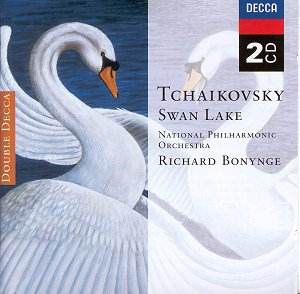These two well filled CDs, containing one of Tchaikovsky's
greatest score, represent excellent value for money in this handsomely
produced Decca reissue.
Swan Lake was Tchaikovsky's first ballet, and
followed close on the example set by his favourite composer, the Frenchman
Léo Delibes, of writing a full-scale ballet which tells a story,
like an opera without words. Inevitably the concept challenged contemporary
notions and contemporary standards. But in the longer term we know well
enough that Tchaikovsky's vision was triumphant.
Richard Bonynge, the conductor on this set, enjoyed
a highly successful career as an opera conductor as well as being associated
with the ballet. And his performance is well shaped and well paced,
the lighter dance numbers, such as that of the Little Swans, being particularly
well handled. The National Philharmonic Orchestra, a recording ensemble
which attracted the best players around in London at the time, brings
a highly polished and rich toned standard of playing. There is no question
that these are attractive features, and no one acquiring these discs
will go unrewarded.
The quasi-operatic drama is something in which Bonynge
revels, and quite rightly. This is apparent, in fact, from the very
opening, with its heavy drumrolls and pounding brass, which join to
make an immediate impression, one which is repeatedly confirmed as the
music proceeds.
The recorded sound is generally pleasing, though the
string sound might benefit from more bloom and fullness. Occasionally,
and most especially in Act IV, there are some indulgently slow tempi
which rob the music of a certain impetus. This is a criticism which
cannot be ignored in the context of listening to the complete ballet
without the support of the visual element. Not that there is anything
wrong in doing so, of course, since Tchaikovsky's ballets are symphonic
in their weight of development, and carry their momentum across the
longer term..
This is undoubtedly an appealing package which offers
very good value. Ultimately, however, it must give way to Russian performances
such as those (on Melodiya) conducted by Vladimir Fedoseyev, Gennady
Rozhdestvensky or Yevgeny Svetlanov. All these have a more burning intensity
and conviction, despite their uneven and occasionally rough recorded
sound. That is not to dismiss the present set, which will give much
pleasure; and perhaps in an ideal world the committed collector might
possess more than one recording.
One thing above all is for sure; this is a great piece
and excerpts alone, in the form of the popular Suite, are a poor substitute
for the glorious full score.
Terry Barfoot

